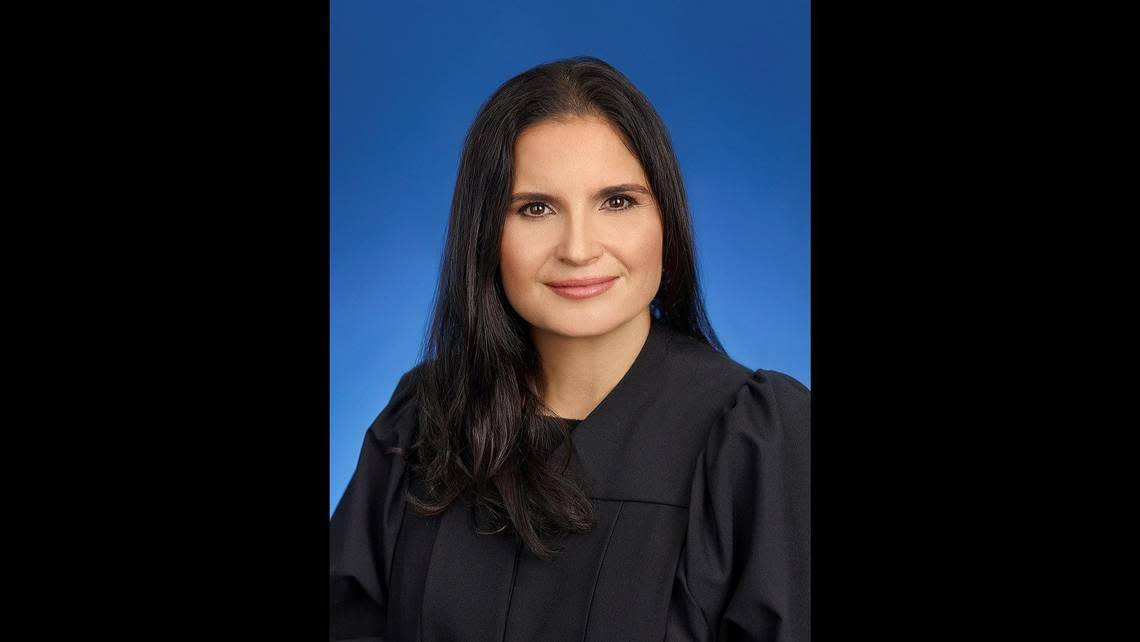5 things to know about Florida judge who dismissed Trump’s classified documents case

- Oops!Something went wrong.Please try again later.
- Oops!Something went wrong.Please try again later.
Florida federal judge Aileen Cannon, who on Monday dismissed the case against former president Donald Trump over his handling of classified documents in Florida, saying the appointment of a special counsel by the U.S. attorney general was unconstitutional, has deep South Florida roots.
In 2020, Trump nominated her to the federal bench and the U.S. Senate confirmed her to serve in the Southern District of Florida, where she presides in Fort Pierce.
Here are a few other things to know about the 43-year-old Cannon:
1. Born in Colombia, raised in Miami
Cannon was born in Cali, Colombia, in 1981 to a Cuban mother and a father from Indiana. She was raised in Miami and attended Ransom Everglades, the exclusive private middle and high school in Coconut Grove.
Ransom officials on Monday declined to answer any questions from the Herald about her school years.
She went on to Duke University, where she received a bachelor’s degree in 2003. She then attended law school at the University of Michigan, from which she graduated magna cum laude in 2007.
2. Interned at el Nuevo Herald
While she was at Duke, she had a summer internship at el Nuevo Herald, the Spanish-language daily that is the sister publication of the Miami Herald.
During her three-month internship in 2002, Cannon wrote more than a dozen articles, which she noted in her written questionnaire of the U.S. Senate Committee on the Judiciary after her nomination to the federal bench.
Some of the translated headlines:
▪ “Tomatoes May Help Reduce Tumors”
▪ “A Fertile Book about Infertility”
▪ “A Mural in Homage of the Latin Woman”
▪ “Prenatal Yoga: A Healthy Alternative for Delivery”
3. Career path
After graduating from law school, she clerked for the 8th U.S. Circuit Court of Appeals in Des Moines, Iowa, and later landed a job at the Los Angeles law firm, Gibson, Dunn & Crutcher.
In 2013, Cannon joined the U.S. Attorney’s Office in Miami as a federal prosecutor. She initially worked in the major crimes section before moving to the appellate section, where she handled cases involving convictions and sentencings.
Although she completed a few trials to verdict, her application for a federal judgeship highlights her experience as a legal writer.
4. Confirmation to federal bench
At the time of her confirmation in 2020, Cannon was one of the youngest federal judges appointed by Trump, securing a lifetime position at 39. Her appointment was part of Trump’s broader strategy to reshape the federal judiciary with young, conservative judges.
She was nominated to fill the seat vacated by Judge Kenneth Marra, who had assumed senior status. The American Bar Association requires at least 12 years of law practice as one of its approval criteria, and Cannon just met that standard.
Trump nominated her in April 2020, and the Senate confirmed her in November of that year on a 56-21 vote. The vote happened after Trump lost the November 2020 presidential election to Joe Biden.
5. Appeals court slams her ruling
In 2023, a federal appellate court panel in Atlanta overturned Cannon’s decision to appoint a special master to review documents seized from Donald Trump’s Palm Beach residence at Mar-a-Lago, stating she had no authority to intervene.
The three appellate court judges were all Republican appointees, including two nominated by Trump.
The judges, in their ruling, said the Trump legal team’s arguments were a “sideshow” and that his lawyers never proved the FBI agents who seized the documents from Trump’s Mar-a-Lago estate showed a “callous disregard” for the former president’s constitutional rights.
It was this case that she dismissed on Monday.
Miami Herald staff writers Jay Weaver and Ana Claudia Chacin contributed to this report, as did McClatchy Washington correspondent Michael Wilner.

